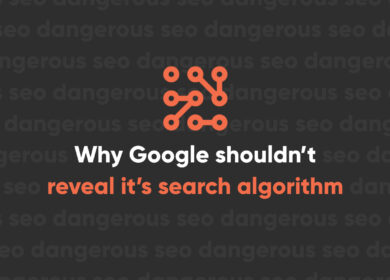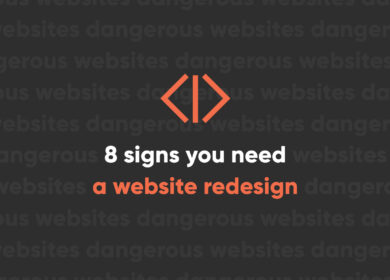
Magento Commerce vs. Shopify Plus: Which one is best for your business?
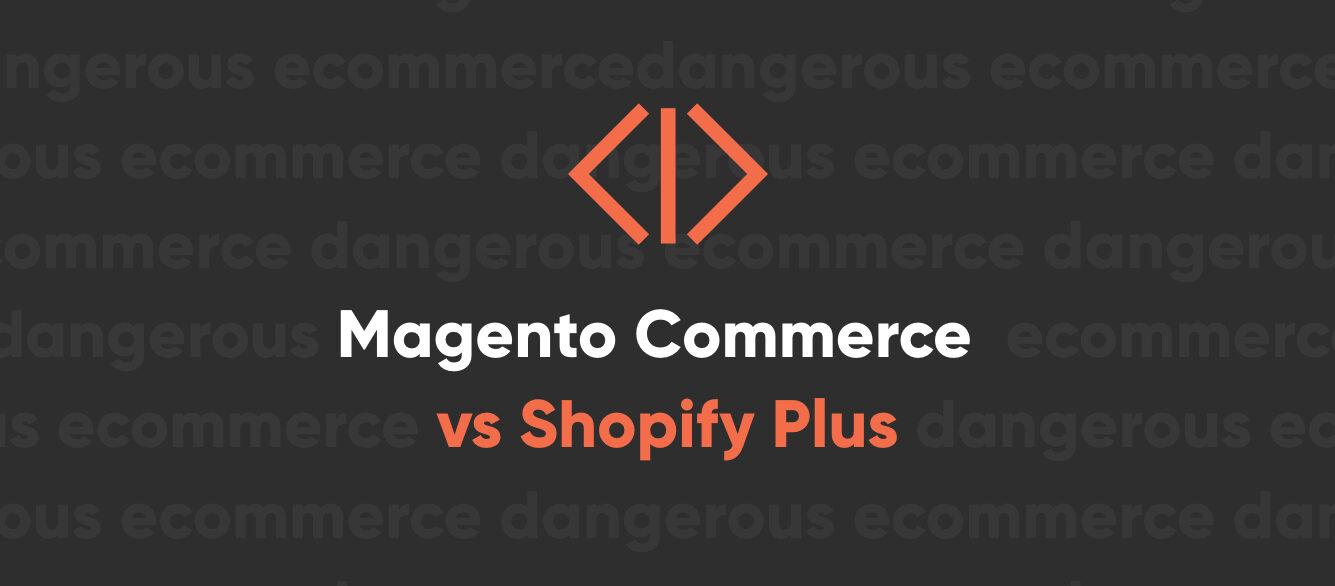
Whether you’re a new business looking to build an online presence or an existing brand that isn’t happy with your current setup, choosing the right ecommerce platform is one of the most important decisions you’ll make. After all, it can be very time consuming and expensive if you end up making the wrong choice.
While there are dozens of options available, from 3dcart to Wix, chances are you’ve already done enough research to narrow it down to two of the most popular and well-supported platforms on the market today: Magento and Shopify.
While both platforms offer multiple versions with varying degrees of functionality, for the sake of this article we will focus on their premium enterprise editions that are designed with ecommerce businesses in mind. Magento Commerce and Shopify Plus are frequently pitted against one another for platform superiority, even though in reality they have very little in common.
In order to help you decide, we’ll take an in-depth look at ten important factors to consider when comparing the two:
Let’s begin.
1. Cost
“Pricing is all about customer value. Price is what you pay. Value is what you get.” -Warren Buffet
When choosing an ecommerce platform, one of the most important factors to consider is how much it’s going to cost you when all is said and done. Of course, what you pay for and how you pay for it differs greatly between the two, as Shopify is a hosted platform and Magento is not. The following figures are average annual costs based on our experience working with the two platforms for a number of clients of various sizes and types.
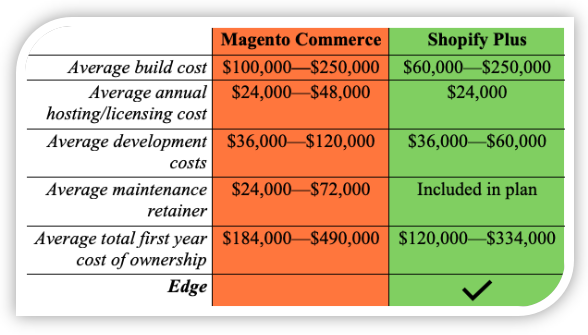
As you can see from the numbers above, Shopify in general has lower costs associated with it. However, depending on your business needs, your web developer, and your hosting client, this could go either way. While Magento might cost you 50% more upfront, it could end up saving you more in the long run. That being said, if you’re looking for a platform with the most transparent and affordable pricing, Shopify is the one for you.
2. Functionality
“Great web design without functionality is like a sports car with no engine.” –Paul Cookson
One of the biggest factors we consider when choosing one product over another is the number of things it can do. Magento and Shopify are both going to give you a great looking site, but what they are actually able to do for your business is what sets them apart. Let’s take a look at some of the differences.
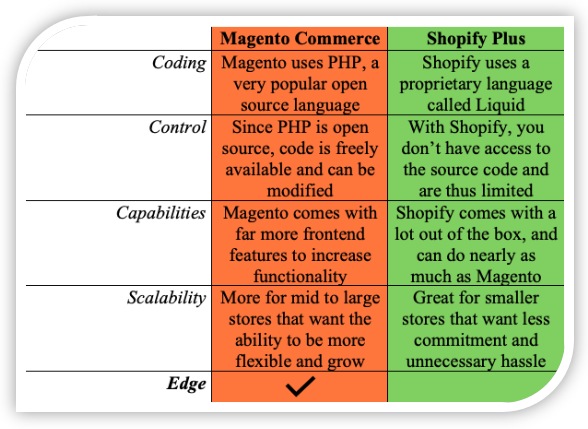
Functionality is one of the biggest strengths of Magento. Unlike Shopify, every aspect of the site is under your control, which is a huge plus for many businesses. The Magento platform is also built around handling data and products in a way that allows for effective management of multiple brands and stores.
3. Design
“There are three responses to a piece of design – yes, no, and WOW! Wow is the one to aim for." -Milton Glaser
The design of your website forms the basis of what your customers will think and feel when they visit. In order to make a good first impression and earn their trust, it’s incredibly important to choose the right theme. Your customers will be much more likely to buy your products and services if your store looks professional and appealing. When it comes to the number of themes available and styles offered, the two platforms differ quite a bit.
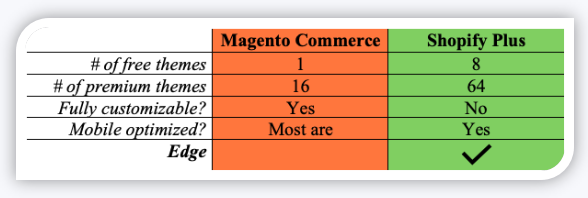
Honestly, this one could have been a tie. Shopify, however, has more themes to choose from out of the box, and each one is super sleek and powerful. Just know that beyond changing basic colors and fonts, Shopify’s proprietary themes don’t allow for a ton of customization. If you want your site to be totally unique, then Magento may be the better choice.
4. Ease of use
“Ease of use may be invisible, but its absence sure isn’t.” -IBM
Whether you’re starting a business from scratch or taking your existing store into the online world, you’re going to want to have as pleasant of an experience as possible. One of the best ways to do that is by choosing an ecommerce platform that is easy to use and at your current skill level. Here’s where Magento and Shopify stack up:
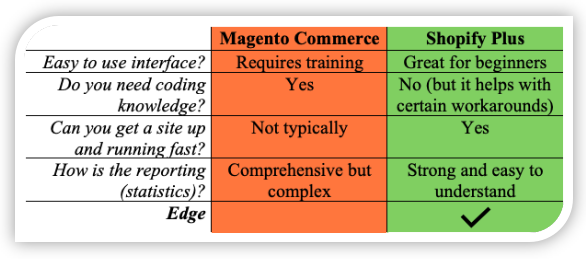
While many experienced developers may prefer the complexity and control that Magento offers, most users would agree that Shopify is by far the simpler of the two platforms to use, especially for beginners. You can get your site up and running much quicker with Shopify, and the base features are much more user-friendly for people of all experience levels.
5. Extensions
“People used to want to be filmmakers and animators; now they want to make apps.” -Bill Plympton
Both Magento and Shopify provide you with everything you need to build a successful ecommerce site. That said, if you want to utilize more advanced tools and capabilities, you’re going to need to integrate apps and extensions. Similar to the apps on your smartphone, these add-ons serve to boost functionality and help automate a multitude of basic tasks.
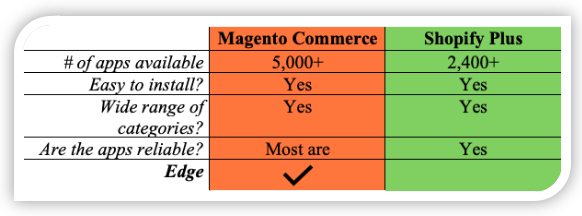
Due to its greater focus on community development, Magento is able to offer far more extensions than the competition. Because of this, Magento has the clear edge in this category.
6. Checkout process
“If you do build a great experience, customers tell each other about that. Word of mouth is very powerful.” -Jeff Bezos
Unless you have no intention of ever selling products online, you’ll need to set up a payment processor on your site. These are essentially services that allow your customers to pay online with a credit or debit card. Both Magento and Shopify offer plenty of options to choose from here, so let’s take a look at their overall differences.
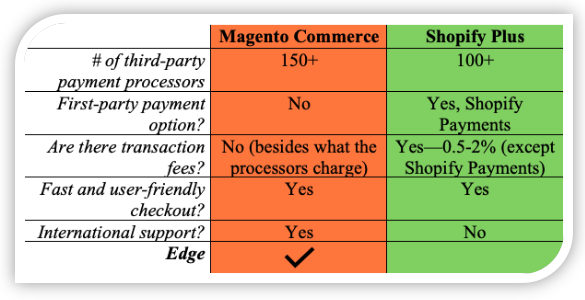
This one wasn’t very close at all. Magento wins out with its sheer number of external payment processor options that support many different countries and languages. While Shopify Payments is nice, the fact that they charge transaction fees for using anything else is a big negative. Keeping more of your money from every sale is just too good to ignore.
7. Marketing
“Good marketing makes the company look smart. Great Marketing makes the customer feel smart.” -Joe Chernov
In order to sell your products online, you’re going to need to properly market them. Fortunately, Magento and Shopify both come with plenty of useful out-of-the-box features that can assist you with grabbing your customers’ attention and filling up shopping carts. The big question though is: which one will help you do it better?
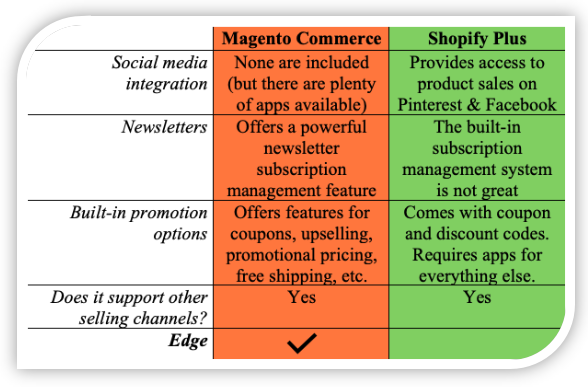
This is definitely one of the closest races so far, but Magento narrowly takes the marketing cake. With better email marketing integration and far more built-in promotion options, Magento is a marketing force to be reckoned with. That said, if you turn to the app store, Shopify can do many of these same things as good if not better.
8. Search engine optimization
“Building a website without SEO is like building a road without direction.” -Unknown
Over 90% of all internet activity begins with a search, which means making your site more visible in Google and other search engines is tantamount to your business’ success. While it may be tempting to go with a free or cheaper option, this decision could come back to haunt you, especially if your business continues to expand. When it comes to SEO capabilities, choosing a platform that assists you as much as possible is crucial.
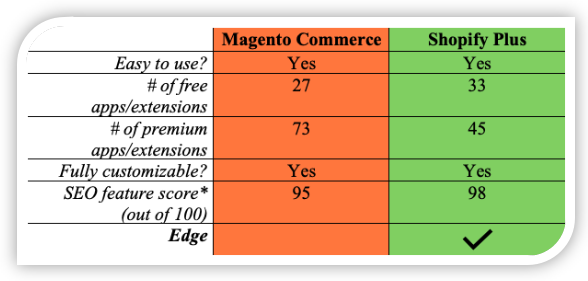
In a 2020 study of the SEO scores* of 16 of the top ecommerce platforms, Shopify emerged as the victor (although Magento wasn’t too far behind). When determining the rankings, they factored such things as independent navigation links, search-friendly page titles and URLs, meta descriptions, ALT tags, and more.
9. International support
“There’s no locality on the web—every market is a global market.” -Ethan Zuckerman
Were you aware that 42% of consumers never make a purchase in their non-native language? This means that if you’re looking to sell internationally, multi-language support and other global market functionality is a must.
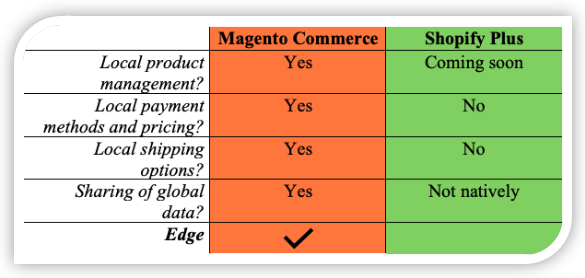
One area that Magento really shines is on the international support front, as it is a trusted and proven solution for many global brands. Shopify, to its credit, is aware of their shortcomings in this area and are working hard to change this, so keep an eye out for forthcoming updates.
10. Customer support
“In the world of internet customer service, it’s important to remember your competitor is only one mouse click away.” -Douglas A. Warner III
When it comes to technology, something will inevitably go wrong. And when it does, it’s good to know that there’s help available. With these two leading ecommerce platforms, the level of help you actually receive could not be more different.
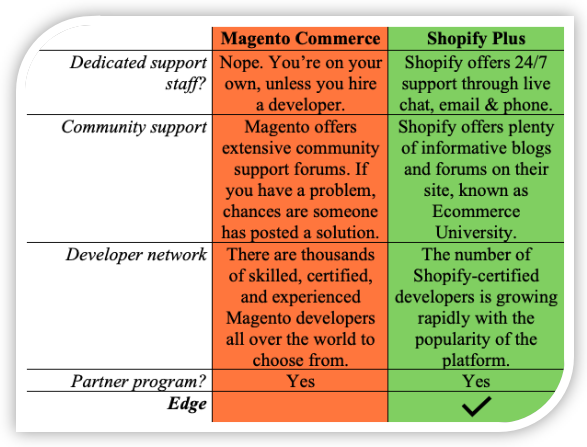
Unless you prefer searching through forums to find your own answers (of which there are many), Shopify wins the support battle hands down. With the ability to speak directly to a dedicated support representative 24 hours a day, 7 days a week, Shopify ensures you will always receive the help you need. That is, of course, if you’re willing to remain on hold.
It’s time to make a choice
Now that we’ve gone over the ten biggest strengths and weaknesses of Magento Commerce and Shopify Plus, you should have a pretty good idea of which ecommerce platform is right for your business.
But, if you’re still not sure, here are some questions you can ask yourself:
- Are you looking for a platform with the most transparent and affordable pricing?
- Is having a more sleek, powerful, and contemporary design important to you?
- Would you prefer an easier to use platform that requires minimal technical knowledge?
- Will your site benefit from more comprehensive and powerful SEO tools?
- Do you want the peace of mind knowing you have a dedicated support staff available?
If you answered yes to the majority of these questions, then Shopify Plus is most likely the platform for you.
If not, ask yourself the following questions:
- Do you require a platform with greater control and functionality?
- Does knowing there’s a more extensive and diverse marketplace of apps appeal to you?
- Do you like the idea of not having to pay transaction fees on each purchase?
- Would you prefer the platform with better marketing tools and integration?
- Do you have a global brand that needs better international solutions?
If you answered yes to the majority of these questions, then Magento Commerce is probably the better platform for your business.
Because each brand is unique and has vastly different goals, it’s impossible for us to say that one platform is better than the other across the board. Magento and Shopify are both great options that will ultimately make your site look great.
If you still can’t decide, you can always contact the web development experts at Perrill. We’ll walk you through the entire decision from start to finish and give you our professional recommendation for your business needs.
Perrill has a full team of in-house developers who are fully certified and have completed over 100 Magento sites to date. We also work with Shopify to meet the diverse needs of our ecommerce clients. It’s time to take your website to the next level and achieve the results (and sales) you deserve.




